Muhammadu Buhari formally takes over as Nigeria’s president this week but his inauguration could not have come at a worse time, with the country reeling from a cash crunch.
Buhari’s All Progressives Congress (APC) party accuses President Goodluck Jonathan’s administration of sabotage for allegedly deliberately handing over the nation in its worst state since independence 55 years ago.
“No electricity, no fuel, workers are on strike, billions are owed to state and federal workers, $60bn owed in national debt and the economy is virtually grounded,” says APC spokesman Lai Mohamed.
But across Nigeria, confidence is still high that Buhari, who headed a military government in the 1980s, will fix the mess.
Buhari won Nigeria’s first-ever opposition victory in March 28 elections.
Thirty years ago, Buhari’s 15-month military regime was characterised by a crackdown against so-called “indiscipline” and corrupt practices, which sometimes crossed the line into abuse of power.
But he has said things will be different this time round, with decades of military rule abandoned since 1999 in favour of multi-party democracy, parliament and the constitution.
In February, the 72-year-old cautioned however that there was a need to “temper high expectations on the part of those who are expecting miracles to happen”.
But across the country many believe that he can follow through on his election pledge of sweeping change to stop the rot in Africa’s most populous nation.
There are high hopes that the new administration will create jobs. People also want an end to the Boko Haram insurgency which has claimed at least 15,000 lives since 2009.
To be sure, Nigeria’s military has the upper hand against Boko Haram but there is still work to do to maintain the peace. On most other fronts, however, the incoming government has an uphill task. There are calls to diversify the economy, increase taxation to boost government coffers and tackle poverty that the APC says blights the lives of some 110mn of Nigeria’s more than 170mn people.
Almost everyone talks of corruption, which the austere Buhari believes has made the country a global laughing stock.
To tackle the fuel crisis, Buhari, who once headed a government oil agency, has to convince fuel importers holding out for claimed government subsidy arrears by shutting depots, that they will be paid.
Opec-member Nigeria produces some 2mn barrels of oil per day but has no functioning refineries and is forced to import crude products such as petrol and diesel.
The government keeps fuel at below market price at the pumps, paying the difference to importers in a system the government says is riddled with corruption.

